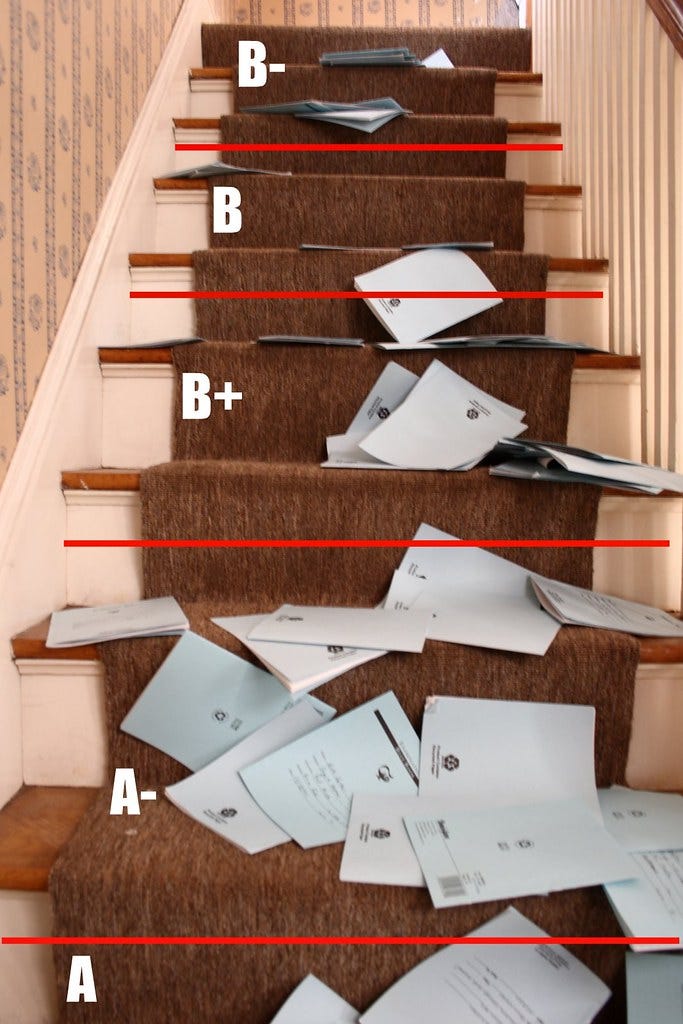Tip: Grade Review Policy
Ask students to do additional critical thinking about their response and the course materials, and present evidence that justifies a higher score.
I have a high school and middle school student, both of whom have experience with test retakes. The policy in their school district is that they can retake any test on which they scored less than 80%, provided that they complete a structured and worthwhile retake preparation, and with the caveat that their final grade on the test will max out at 80%. As a parent, I think that this policy is exceedingly fair to the student, and does a good job of preparing students to continue working towards mastery of the material even if their first test score is not what they hoped it would be.

Although I don’t see wide implementation of test retakes at the college level, there are always students who feel that their performance on an task deserved more points than they were awarded. I came across a grade review request process outlined by a professor at San José State University, Ted Coopman, and thought that it provided some interesting food for thought. It’s particularly relevant as we enter that part of the semester where students are starting to realize - if they haven't realized already - they're running out of time and are getting a little bit worried about their grade. I have students pretty much weekly throughout the semester ask for either more points on an assignment or a quiz. Sometimes - often - it's an issue related to the LMS auto-grading process. But sometimes the area is a little bit more gray and it's not a matter of just correcting an incorrect point allotment, but really re-evaluating their response. I do this, of course, but I think the process outlined by this faculty member is helpful because it puts the onus for explaining why an assignment response meets the task criteria on the student.
He outlines that on assignments, students must:
Carefully review all comments on your assignment and compare them to the instructions and grading criteria for the assignment. If you still feel you have grounds for a grade review request you must construct an argument for any modifications in your score based on the specifics of your work compared to the instructions and the criteria for grading. For example, “The instructions state X, the criteria states Y, I did Z, therefore, I deserve to get credit (x number of points) for my work.” The more specific you are the better.
For a quiz or test, he asks students to:
Carefully review the question and the material that the question is based on. All questions have notes that indicate page numbers or slide numbers where the correct information is located. Recall that while there might be several answers that could be correct, there is only one best answer. Copy the entire quiz question…[p]aste it in the body of an email. Quote the relevant material from the text/lecture and explain why your answer should count.
I really appreciate this approach because it asks students to do additional critical thinking about their response to the task, situate their response within the course materials, and present some sort of an explanation with evidence from their assignment that justifies the higher score. I can imagine this working equally well with evaluation of writing assignments - provided that the instructor has started with a clear rubric that outlines student expectations.
Of course, a concern is that students will try to argue their way into a better grade on every assignment, but it seems like Dr. Coopman has found a reasonable balance by outlining the steps a student would have to go through and the specific criteria that would need to be addressed in their grade review request. I could envision it also being successful to offer students this option only for certain types of assignments - higher points assignments or quizzes, and not homework, for example. Or, only for certain categories - exams, yes; low-stakes quizzes, no.
I think this approach meshes nicely with earlier explorations on how to reduce grading load while still providing supportive and helpful feedback to students on their work, and would certainly make sense within the more structured specs grading scheme. This approach also provides a fair and standard response to students who try to justify grade changes based on their perception of work put into the task - the disconnect between effort and outcome. Each semester there are students who approach their class performance from an effort perspective: they feel they have worked very hard (and of course many have), and they wish their outcomes reflected their perceived effort. I try to have empathy for this perspective, and emphasize that I acknowledge their effort while being able to assess only their outcomes.
Happy grading!




